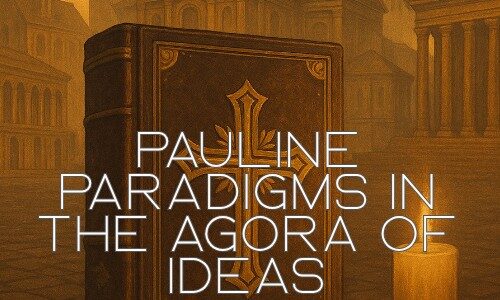Pauline Paradigms and the Agora of Ideas
Level: Master’s
Course Length: 10 weeks (approx. 120–150 hours total if following full module path)
Delivery Mode: Competency-based, self-paced with required final exam
Course Overview
This course explores the profound influence of the Apostle Paul on the development of Western moral, social, and political thought. Drawing on the framework of Pauline Paradigms and the Agora of Ideas, it examines how Paul’s radical teachings about identity, freedom, grace, and community reshaped the ancient world and laid the intellectual foundation for human rights, democracy, and social justice.
Students will analyze Pauline thought in dialogue with the Greek and Roman philosophical traditions, trace its evolution through Western history, and consider both the consequences of societies rejecting these principles and the alternative models offered by non-Pauline civilizations.
The course is competency-based:
-
Students may complete all modules and lesson plans to prepare for the final exam, or
-
If they already have sufficient background, they may skip directly to the final competency exam.
Competency is demonstrated through the ability to articulate, explain, and critically assess the enduring influence of Pauline paradigms on modern society.
Learning Outcomes
By the end of this course, students will be able to:
-
Explain Paul’s key paradigms concerning identity, liberty, authority, grace, ethics, and community.
-
Trace the historical evolution of these paradigms through Western civilization.
-
Evaluate the consequences of societies rejecting Pauline principles.
-
Compare Pauline moral foundations with alternative cultural frameworks (e.g., Confucianism, Legalism).
-
Integrate Pauline thought into contemporary discussions of justice, liberty, and social order.
Weekly Breakdown (10 Weeks)
Week 1: Paul in the Agora of Ideas (8–10 hours)
-
The historical and philosophical background of the Greek agora.
-
Paul’s entry into the marketplace of ideas.
-
Competency: Explain the central thesis that Pauline principles form the unseen foundation of Western moral order.
Week 2: The New Man and the Individual (12–14 hours)
-
Identity in the ancient world vs. Paul’s radical notion of the “new creation.”
-
Universal dignity: “neither Jew nor Greek, slave nor free.”
-
Competency: Articulate how Paul introduced the modern concept of the individual.
Week 3: Freedom from the Law and Liberty of Conscience (10–12 hours)
-
Extrinsic vs. intrinsic motivation: law, fear, and grace.
-
The shift toward internalized moral freedom.
-
Competency: Explain how Pauline thought shaped later notions of liberty and human rights.
Week 4: Civil Society and the Body of Christ (10–12 hours)
-
The metaphor of the Body of Christ as a paradigm for civil society.
-
Mutual obligation and equality in community.
-
Competency: Analyze how Paul’s social metaphors informed modern civic structures.
Week 5: Authority and Inclusion (12–14 hours)
-
The “powers that be” and the legitimacy of authority.
-
The weak and the strong: Paul’s inclusive political ethic.
-
Competency: Assess Paul’s influence on concepts of authority and minority inclusion.
Week 6: Grace, Humility, and Power (12–14 hours)
-
Justification by grace as a paradigm of unmerited worth.
-
Power through weakness and the paradox of humility.
-
Competency: Articulate Pauline contributions to ethical and political discourse on justice and power.
Week 7: Household Codes and Social Order (12–14 hours)
-
The Pauline household codes in historical context.
-
Work, ethics, and the sanctity of labor.
-
Competency: Evaluate Paul’s influence on family, labor, and social hierarchy.
Week 8: Love as a Political Motive (10–12 hours)
-
Agape as a social and political principle.
-
The transformation of vengeance-based ethics into love-based justice.
-
Competency: Explain how love became a political and social paradigm through Pauline thought.
Week 9: The Rejection of Pauline Foundations (12–14 hours)
-
Case studies: French Revolution, Communist Russia, Nazi Germany.
-
What happens when societies abandon Pauline principles.
-
Competency: Critically analyze historical evidence for regression in the absence of Pauline ethics.
Week 10: Comparative Civilizations and the Enduring Apostle (10–12 hours)
-
China and the Confucian/Legalist alternative.
-
Lessons from non-Pauline moral frameworks.
-
Integration of Pauline paradigms into contemporary global discourse.
-
Practice exam and integration of all paradigms.
-
Final Competency Exam (required).
Assessment
-
Competency Exam (100%): Students must demonstrate mastery by articulating and critically evaluating Pauline paradigms and their influence on modern society.
-
Optional formative assessments: Reflection essays, historical analyses, and comparative case studies (not required).
Curriculum
- 10 Sections
- 21 Lessons
- 10 Weeks
- Week 1: Paul in the Agora of Ideas (8–10 hours)The historical and philosophical background of the Greek agora. Paul’s entry into the marketplace of ideas.3
- Week 2: The New Man and the Individual (12–14 hours)Identity in the ancient world vs. Paul’s radical notion of the “new creation.” Universal dignity: “neither Jew nor Greek, slave nor free.”3
- Week 3: Freedom from the Law and Liberty of Conscience (10–12 hours)Extrinsic vs. intrinsic motivation: law, fear, and grace. The shift toward internalized moral freedom.3
- Week 4: Civil Society and the Body of Christ (10–12 hours)The metaphor of the Body of Christ as a paradigm for civil society. Mutual obligation and equality in community.3
- Week 5: Authority and Inclusion (12–14 hours)The “powers that be” and the legitimacy of authority. The weak and the strong: Paul’s inclusive political ethic.3
- Week 6: Grace, Humility, and Power (12–14 hours)Justification by grace as a paradigm of unmerited worth. Power through weakness and the paradox of humility.3
- Week 7: Household Codes and Social Order (12–14 hours)The Pauline household codes in historical context. Work, ethics, and the sanctity of labor.3
- Week 8: Love as a Political Motive (10–12 hours)Agape as a social and political principle. The transformation of vengeance-based ethics into love-based justice.3
- Week 9: The Rejection of Pauline Foundations (12–14 hours)Case studies: French Revolution, Communist Russia, Nazi Germany. What happens when societies abandon Pauline principles.3
- Week 10: Comparative Civilizations and the Enduring Apostle (10–12 hours)China and the Confucian/Legalist alternative. Lessons from non-Pauline moral frameworks. Integration of Pauline paradigms into contemporary global discourse.4
Instructor

